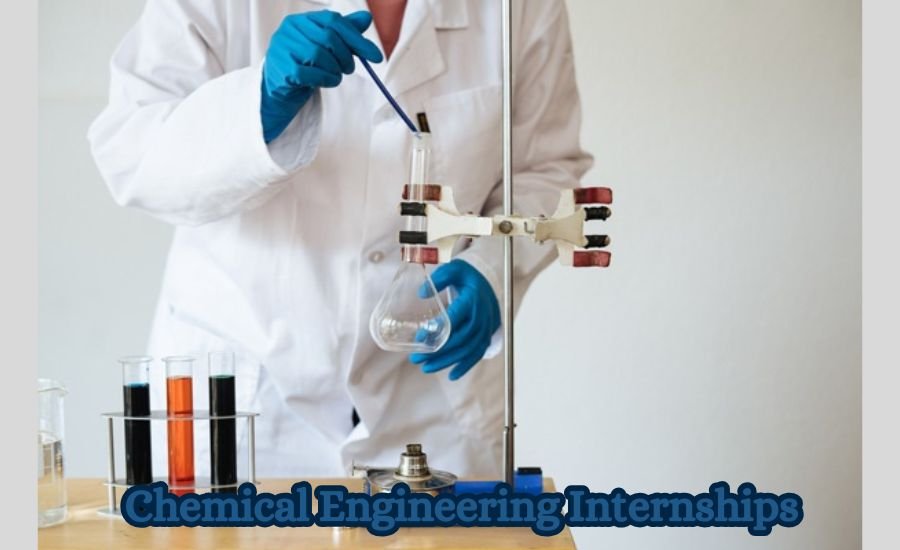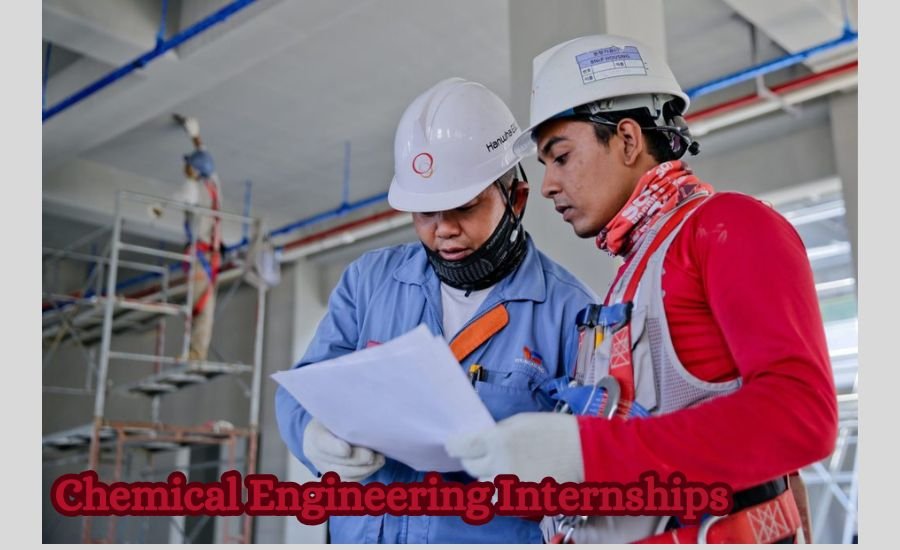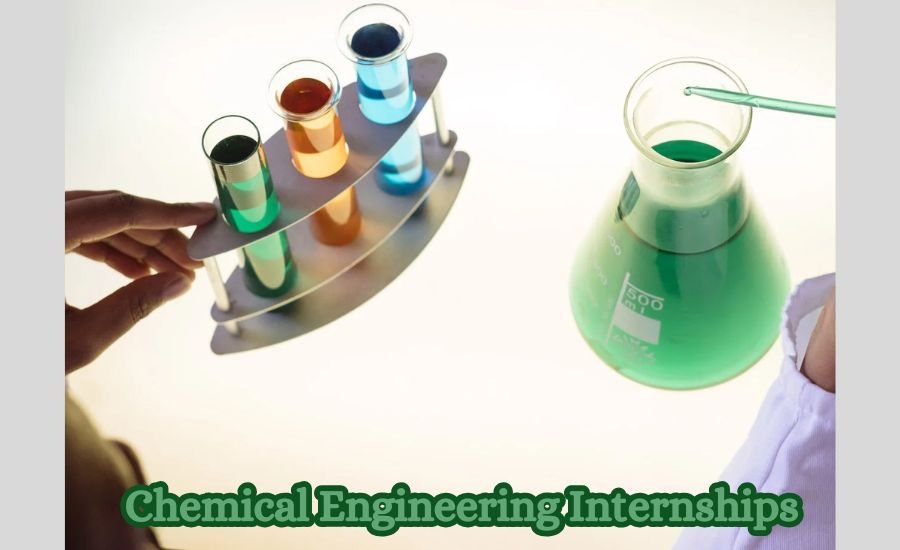Chemical engineering internships are the key to gaining real-world experience and hands-on skills in the field of chemical engineering. At IdeaNestle, we believe that these internships play a powerful role in building a strong foundation for future chemical engineers. Whether you’re a student or a recent graduate, taking part in a chemical engineering internship can make a huge difference in your career journey.
In this post, we’ll explore everything about chemical engineering internships—from what to expect to how to make the most of your experience. If you’re eager to step into the world of chemical engineering with confidence, keep reading to discover the benefits, tips, and exciting possibilities that await you.
What Are Chemical Engineering Internships and Why Are They Important?
Chemical engineering internships offer students a hands-on experience in the world of chemical engineering. They provide real-world skills that are hard to learn in a classroom alone. Internships are a great way to see what being a chemical engineer is really like.
One big reason internships matter is that they let students test out their interests. Working in the field gives students a chance to explore different areas, like energy, food production, or environmental science. This experience can guide them toward the right path in their career.
Additionally, internships help students build professional connections. Meeting mentors and colleagues gives students a network they can rely on for advice and job leads. This network can be incredibly valuable as they start their careers.
Lastly, having an internship on a resume makes a big difference. It shows employers that the student has practical experience and a strong interest in the field. This can make it easier to land a full-time job after graduation.
Top Benefits of Chemical Engineering Internships for Students
Chemical engineering internships provide many benefits for students ready to start their careers. First, they teach real-world skills that can’t always be learned from books. Students can practice problem-solving and teamwork in an actual engineering setting.
Another benefit is that internships often offer new insights into the field. Students can explore different industries, from manufacturing to pharmaceuticals, to find what excites them most. This experience is helpful for making informed career choices.
Internships also give students a chance to apply what they’ve learned in class. This hands-on experience makes theories from the classroom come to life. By working directly with engineers, students see how lessons apply in real life.
Finally, an internship helps students become more confident. They gain the skills and knowledge that make them feel ready to start their first job. This confidence can make the transition from school to work much smoother.
How to Find the Best Chemical Engineering Internships Near You
Finding the right chemical engineering internships can be challenging, but with the right approach, you’ll find great options. Start by checking your school’s career services. Many universities have partnerships with companies looking for interns and can guide you to available positions.
Another good option is to look on job search websites. Websites like LinkedIn, Indeed, and Glassdoor often list internship opportunities specifically for chemical engineering students. You can filter by location to find ones close to you.
Networking is also very useful. Attend industry events or join engineering clubs where you can meet professionals who might know of internship openings. Sometimes, internships are filled through connections before they’re even posted online.
Finally, consider contacting companies directly. If you’re interested in a specific company, reach out and ask if they offer internships for chemical engineering students. This proactive approach shows your interest and may lead to exciting opportunities.
A Day in the Life of a Chemical Engineering Intern: What to Expect

A day in the life of a chemical engineering intern is filled with learning and hands-on tasks. In the morning, interns may start by reviewing project goals with their team. This meeting helps everyone understand the day’s objectives and how they’ll contribute.
After the meeting, interns often work on their assigned projects. These tasks might include experiments, data analysis, or equipment checks, depending on the industry. Interns learn how to handle tools and software used by professional engineers, gaining real skills.
During the afternoon, interns may attend training sessions or meet with mentors. These sessions are important for learning new techniques or understanding complex processes. Internships are designed to teach, so questions are encouraged.
At the end of the day, interns usually recap their progress with their supervisor. They discuss what they learned and any challenges they faced. This daily feedback helps them improve and prepares them for more responsibility in future roles.
Skills You Can Gain from Chemical Engineering Internships
Chemical engineering internships provide valuable skills that last a lifetime. One key skill is problem-solving. Interns learn to approach challenges in creative ways, which is essential for engineering.
Teamwork is another important skill. Working alongside other engineers teaches interns how to collaborate and communicate effectively. In real-world projects, teamwork helps ideas flow smoothly and leads to better results.
Technical skills are also a big part of these internships. Interns get to use specialized tools and software, like simulations or data analysis programs. These technical skills make interns more attractive to future employers.
Lastly, time management is a skill that’s often overlooked but very important. Interns juggle multiple tasks and deadlines, learning how to prioritize their work. This experience helps them manage their time well in professional roles.
Top Companies Offering Chemical Engineering Internships
Several top companies offer chemical engineering internships for students eager to learn. Big names like ExxonMobil, Dow Chemical, and BASF are known for their comprehensive internship programs. These companies provide valuable training and mentorship for interns.
Another excellent place for internships is the pharmaceutical industry. Companies like Pfizer and Johnson & Johnson often hire chemical engineering interns to assist in research and development. Interns get hands-on experience with new products and processes.
The energy sector also offers good internship options. Companies like Chevron and BP have roles for chemical engineering students in areas like environmental engineering and process improvement. Working in energy helps interns understand the importance of sustainable practices.
Lastly, smaller tech startups can be great for internships. These companies often provide interns with more responsibility and varied tasks. Students gain a broad set of skills and experience, which is valuable in today’s job market.
How to Prepare for a Chemical Engineering Internship Interview
Preparing for a chemical engineering internship interview takes time and effort. This shows your interest and helps you answer questions related to the company’s work.
Review basic chemical engineering concepts, as interviewers may ask technical questions. Brush up on topics related to the internship role, like safety standards, materials science, or process engineering, so you’re ready for any question.Questions such as “Why do you want to study chemical engineering?”
Practice answering common interview questions. Questions such as “Why do you want to study chemical engineering?” or “What are your strengths?” Answers that are clear, honest, and concise are often sought.”
Lastly, think of questions to ask the interviewer. Good questions show that you’re thinking ahead. You might ask about the team you’d work with or what a successful intern looks like. This helps you learn more and leaves a positive impression.
Real Stories: Success Through Chemical Engineering Internships
Real success stories from chemical engineering internships show how valuable these experiences can be. Many interns find that their internships lead to full-time job offers. Employers often look to hire interns who’ve already trained with them because they understand the company’s systems and values.
Some interns go on to work for different companies but say the skills they gained were essential. They learned practical techniques and developed confidence in their abilities. These skills made them stand out in future job applications and interviews.
Internships can also help students decide on their career paths. For example, some interns start in a research role but realize they prefer production or project management. These experiences allow students to explore their interests in real settings.
Finally, interns often talk about the mentors they met during their experience. These mentors provide advice, answer questions, and offer guidance that helps interns navigate their early careers. Mentorship is a big part of what makes internships so valuable.
Chemical Engineering Internships Abroad: Pros, Cons, and Tips

Internships abroad offer a unique way to learn about chemical engineering in a different setting. One major benefit is the chance to work in another culture, which helps interns become more adaptable and open-minded. They learn how engineering practices vary across regions.
However, there are also challenges. Moving to a new country for an internship can be costly and requires a lot of planning. Interns need to handle visa requirements, housing, and possibly language barriers. It’s a rewarding experience but can be challenging to arrange.
For those interested, it’s essential to research the company and country in advance. Knowing what to expect helps interns prepare for any cultural differences they may encounter. Research also helps ensure the internship aligns with their goals.
Internships abroad often stand out on resumes. Employers see that the intern is adaptable and willing to step out of their comfort zone. This experience can make a significant difference in future job opportunities.
How to Make the Most of Your Chemical Engineering Internship Experience
Making the most of a chemical engineering internship is all about being proactive. Start by setting personal goals, like learning specific skills or gaining certain experiences. As an intern, it’s important to ask questions. Asking questions also shows that you’re engaged and interested in understanding your tasks fully, which can lead to better performance.
Taking notes is another great habit. Writing down what you learn each day helps reinforce new knowledge and makes it easier to review later. Notes are useful when preparing for future interviews, as they remind you of the skills and concepts you practiced.
Lastly, stay open to feedback. Supervisors may offer suggestions to help you improve. Taking feedback positively shows that you’re committed to growing and learning from the experience.
Challenges in Chemical Engineering Internships and How to Overcome Them
Chemical engineering internships come with unique challenges, but overcoming them can make interns stronger. One common challenge is the technical knowledge required. Interns might feel overwhelmed by complex processes and industry terms. Taking time to review what you learned in class can be a big help.
Another challenge is adjusting to a professional environment. Working in a lab or office requires different skills than a classroom. Interns must learn to manage their time well and adapt to working with a team of experienced engineers.
Safety is a crucial part of chemical engineering, and following safety protocols can be challenging at first. Interns need to understand and respect all safety guidelines to ensure a safe work environment. Asking for extra training can help if you’re unsure about specific procedures.
Finally, balancing multiple tasks can be tough. Interns often handle different projects at once. Creating a daily plan and prioritizing tasks can make managing these responsibilities easier.
Internship Vs. Full-Time Job: Differences for Chemical Engineering Roles
Internships and full-time jobs in chemical engineering internships share some similarities, but there are clear differences. Internships are often more focused on learning, with interns receiving guidance and supervision. In contrast, full-time employees are expected to work independently.
Interns usually handle smaller projects or assist with parts of a larger task. Full-time engineers, however, often manage entire projects from start to finish. This added responsibility is something interns gradually prepare for as they gain experience.
Full-time employees also face different expectations. They’re responsible for meeting deadlines and delivering consistent results, whereas interns are primarily focused on learning and improving. Interns can use this time to build their skills before moving into a more demanding role.
Lastly, full-time positions come with benefits like healthcare and retirement plans, which internships typically do not offer. Interns get a taste of the industry but can look forward to these benefits as they advance in their careers.
You Should Know: Examples Of Classical Conditioning in Everyday Life
Chemical Engineering Internships: Paid vs. Unpaid – What’s Worth It?
Choosing between paid and unpaid chemical engineering internships can be a big decision. Paid internships are often preferred because they provide both experience and financial support. These internships allow students to learn while covering personal expenses, which makes the experience even more rewarding.
However, unpaid internships can also be valuable if they offer unique learning opportunities. Some unpaid internships may give access to specialized training or work with leading professionals in the field, which can be very beneficial. It’s important to weigh the experience offered, even if the position is unpaid.
For students who need income, paid internships might be the best choice. They not only help financially but also show that companies value the intern’s contribution. Paid positions may also lead to full-time offers, as companies invest more in interns they pay.
Ultimately, the decision depends on individual needs. Some students can afford an unpaid internship for the chance to work in a dream company, while others may need financial support. Either way, both paid and unpaid internships provide essential experience for future careers.
Top 5 Networking Tips During Chemical Engineering Internships

Networking is an important part of chemical engineering internships. One way to network effectively is by attending company events. Interns who join meetings or social gatherings have more chances to meet professionals and start conversations.
Another tip is to connect with colleagues on LinkedIn. Sending a personalized message with your connection request can leave a lasting impression. Staying connected after the internship ends helps maintain these relationships for future opportunities.
Asking for informational interviews is also a great way to network. Interns can request a short meeting with professionals to learn about their career paths and gain insights. It shows your interest in the field and helps build valuable connections.
Participating in team projects is another networking opportunity. Working closely with team members allows interns to demonstrate their skills and build trust. Good teamwork often leads to positive relationships that can support your career.
Finally, follow up with mentors or supervisors after the chemical engineering internships ends. A simple thank-you message or update on your progress shows appreciation and keeps the connection alive. These follow-ups can be helpful for future job recommendations.
How to Turn a Chemical Engineering Internship into a Full-Time Job
Turning a chemical engineering internship into a full-time job takes dedication and strategic planning. One way to increase your chances is by demonstrating a strong work ethic. Showing up on time, meeting deadlines, and delivering quality work makes a positive impression on supervisors.
Building relationships with team members is also important. Engaging with colleagues, asking questions, and offering help where possible shows that you’re a team player. Teamwork skills are highly valued by employers and can set you apart.
Taking initiative can also make a difference. Look for additional tasks or responsibilities where you can contribute. Going above and beyond your assigned duties shows that you’re serious about your work and interested in staying with the company long-term.
Lastly, express your interest in a permanent role towards the end of your internship. Letting your supervisor know that you’d like to stay on shows confidence and commitment. If you’ve proven your skills, they might consider you for a full-time position.
Conclusion
Chemical engineering internships are an incredible way to start building a successful career in engineering. They offer hands-on experience, valuable skills, and a chance to explore different fields within chemical engineering. Internships also let students connect with professionals, which can lead to exciting job opportunities in the future. These experiences give interns a solid foundation that helps them feel confident as they enter the job market.
For any student considering a career in chemical engineering internships is a smart step forward. It not only strengthens your resume but also helps you understand what it’s really like to work in this field. By making the most of an internship, students can open doors to future career paths, learn from mentors, and set themselves up for a brighter, successful future.
Must-Have Information: What is a PIP in work
FAQs About Chemical engineering internships
Q: What is a chemical engineering internship?
A: A chemical engineering internship is a hands-on learning experience where students work with professionals in the field, gaining practical skills and knowledge.
Q: Why are chemical engineering internships important?
A: Internships are important because they provide real-world experience, help build essential skills, and often lead to job opportunities after graduation.
Q: How long do chemical engineering internships usually last?
A: Most internships last from 8 to 12 weeks during the summer, but some may be longer, depending on the program and company.
Q: Are chemical engineering internships paid?
A: Many internships are paid, especially with larger companies. However, some may be unpaid, depending on the company and location.
Q: What skills can I learn from a chemical engineering internship?
A: Interns learn skills like teamwork, problem-solving, time management, and technical skills related to chemical engineering processes and equipment.
Q: How can I find a chemical engineering internship?
A: You can find internships through university career services, job search websites, networking, and contacting companies directly.
Q: Do chemical engineering internships lead to full-time jobs?
A: Yes, many interns receive job offers after their internship if they perform well and show strong potential.
Q: What should I include in my resume for a chemical engineering internship?
A: Highlight relevant coursework, any lab or research experience, technical skills, and any previous internships or projects in engineering.
